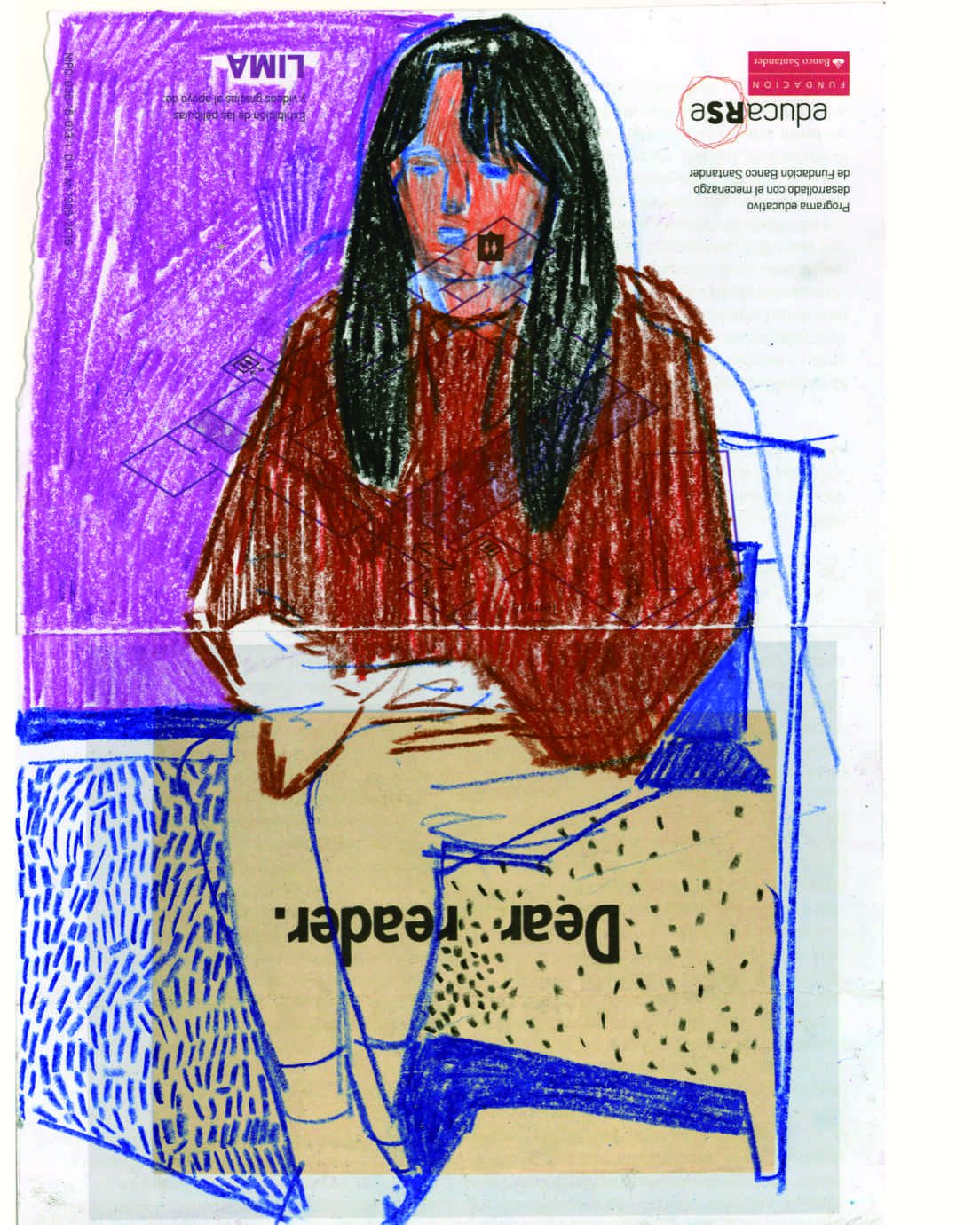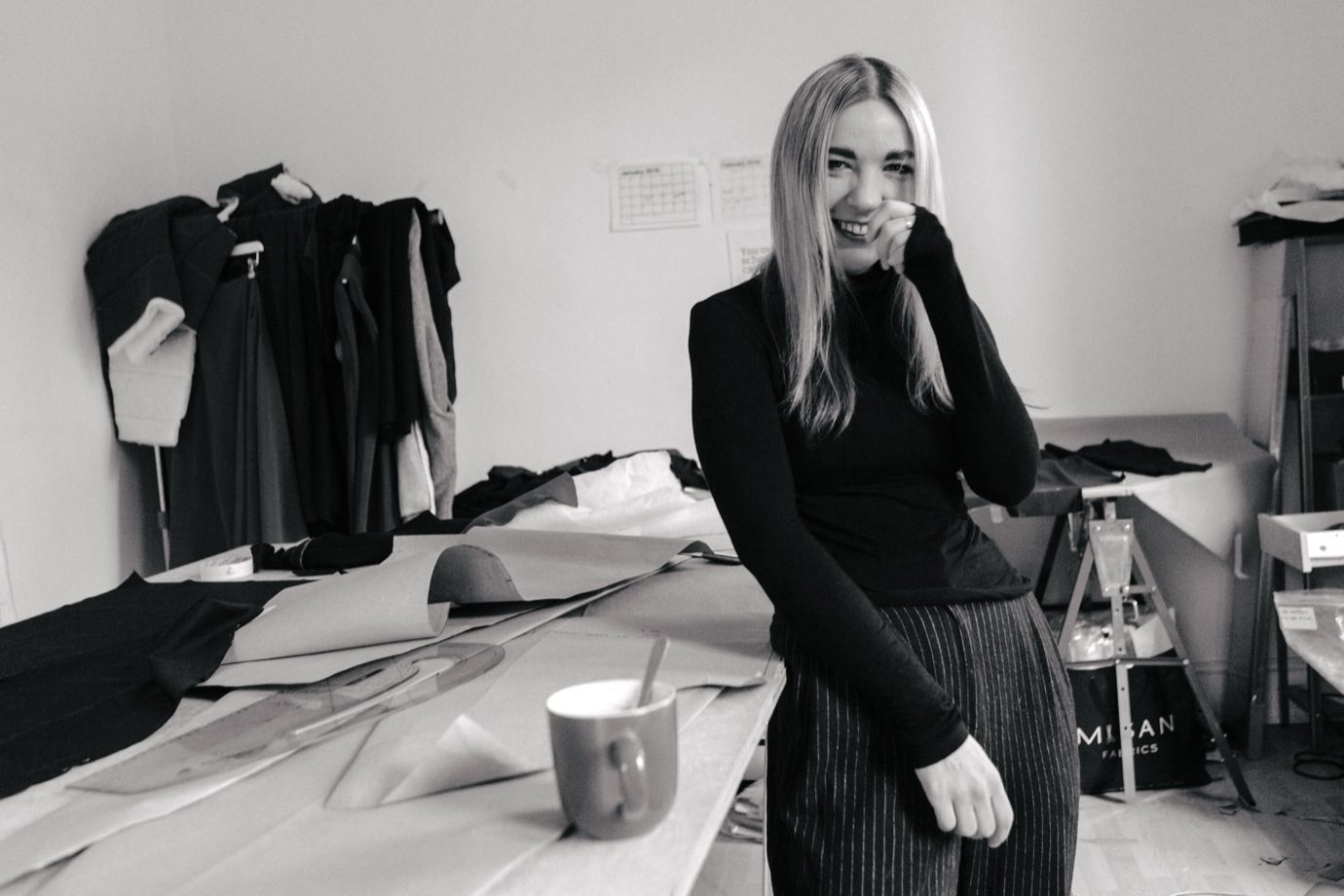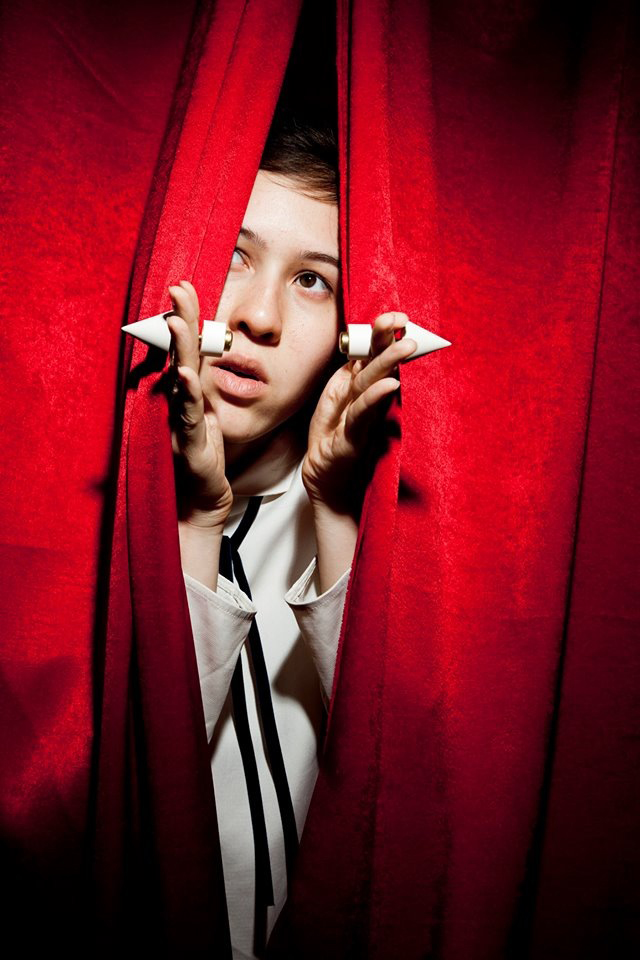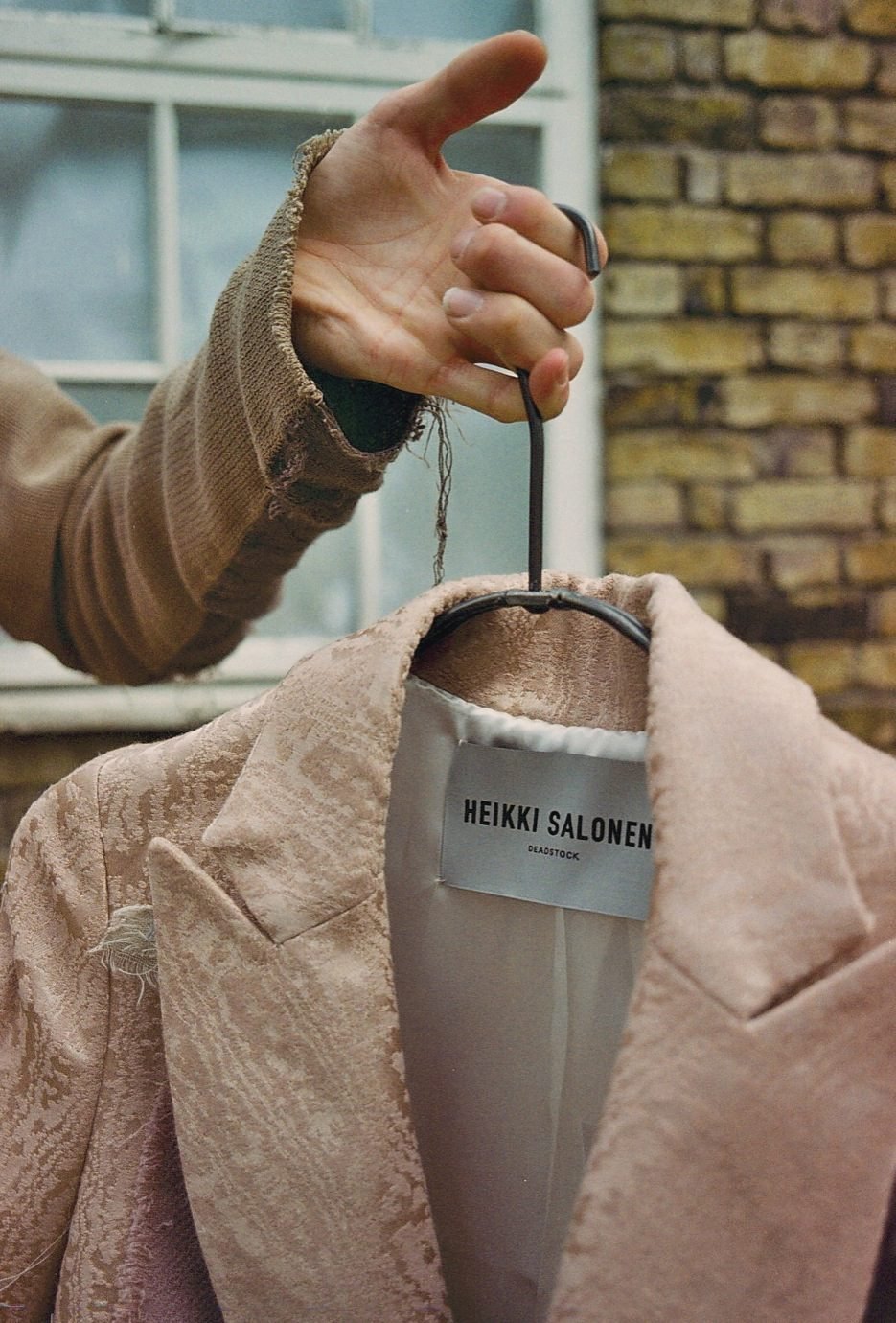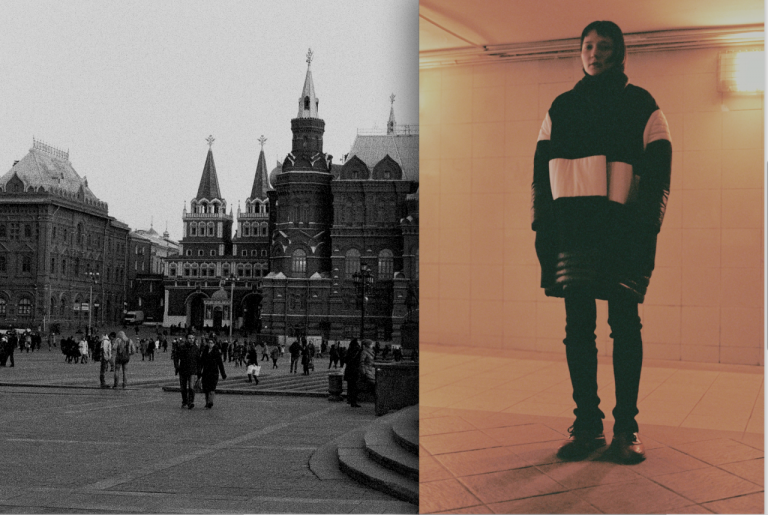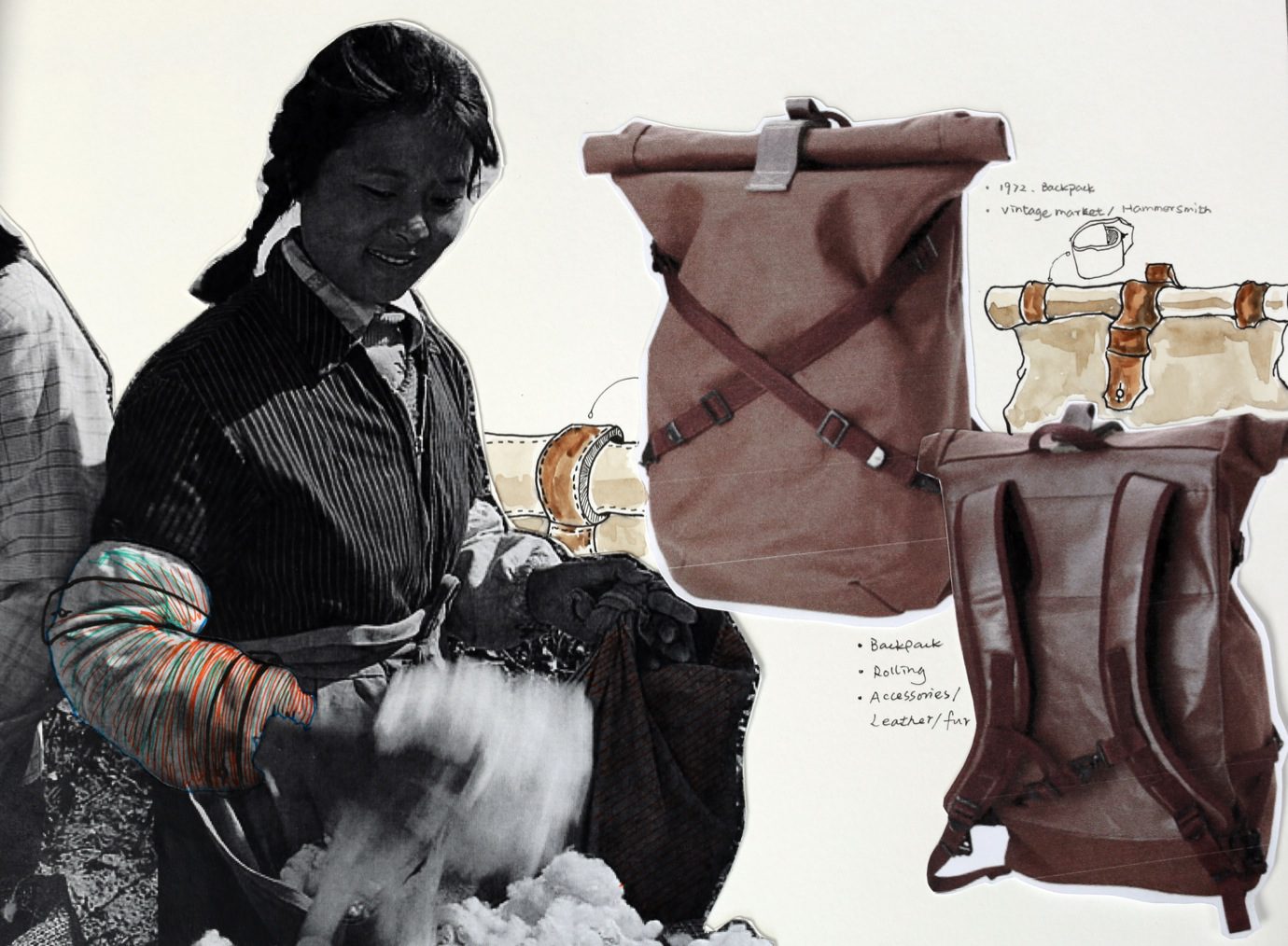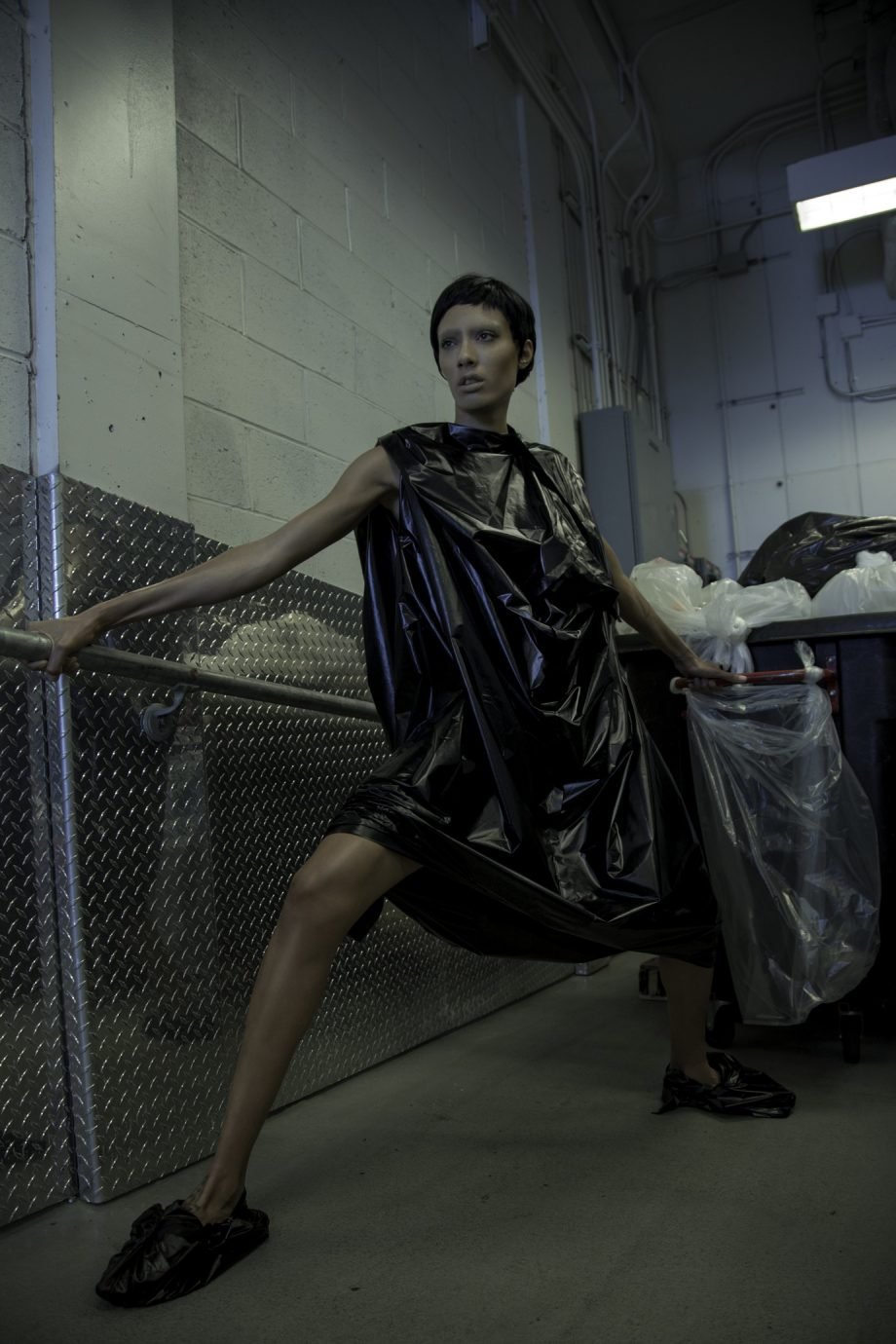I have called Jo-Ann ‘elusive’ over the telephone while trying to pin her down for this interview. “Fashion keeps getting in the way of fashion!” she explained in her Manchester accent while laughing, a lot. Two phone conversations covered her recommendations for Argos air-con towers, her continuous back-and-forth flights to New York, being metaphorically held on gunpoint all the time (the joys of deadlines), how she absolutely hates writing but loves having written (in true Dorothy Parker style), that she falls asleep on top of her laptop, then dreams of pieces being completely written, and wakes up to the reality that nothing is done. She’s also a night writer, I discover when we finally do manage to meet up. “Night into the early morning,” she says, starting to give advice. “One of the things that I find is that if you get up really early, like 4 o’clock, when it’s still night, that’s quite good. But in the end it starts to get to you. It’s like farmers who commit suicide, because they work these hours. Farmers and people on breakfast TV.”
In short: it’s difficult to have a dull conversation with Jo-Ann. It’s hard to hang up on her or leave to the toilet, because you’re too curious to find out what comes after the next phrase. So here it goes, an interview with one of this industry’s rare gems: an editor who is equally as excellent in writing as she is at art directing and commissioning, most notably in her former role as editor-in-chief of Arena Homme +. We started off by talking about the uselessness of fashion-specific education.
Jo-Ann Furniss: If you’re going to be at university, you have to do something that’s worth the money. I studied English literature and art history at Goldsmiths, and I am really glad that I did. It works with what I do now. My studying of fashion was reading magazines, and then working for nothing for years. I just don’t understand it when people do a course in fashion marketing or PR – I mean, what? Terry Jones, the founder of i-D, once went to me and said: “You’re not from one of those courses are you?” He was absolutely against them, because they teach you to think in a formulaic way. It’s worth studying fashion design, because these students don’t just look at what’s going on in fashion, they look at everything, if they’re good. It’s about bringing in all parts of culture. Fashion is actually just one medium amongst many, and that’s why I’m like: why on earth would you sit down, at the point when you actually can have some freedom and really enjoy things? I have not been able to read books properly since I’ve left university.
Would you want to?
Yeah, I do! I don’t want to write anything, I just want to read.
Do you have these ‘bedside books’ that have been lying there for ten years?
Yeah… I started doing this thing of going to L.A. for a month, and often that’s when I’ll re-read books. Sort of coasting on knowledge that I had when I was a teenager, which is really shameful actually. It’s like: “I knew this then! Jesus! And I’m applying it now, damn what have I learnt?” It’s surprising sometimes what comes in handy. I’d be talking and somebody asks “Bloody hell, how’d you know that?” and I’d say “That’s fifty pence worth of my education.” It was often like that with reviewing, which is torture.
But do you like it?
Do I like reviewing, generally? I love doing interviews, I don’t particularly like writing them afterwards.
Transcribing…
[Blegh] …and you’d go “Shut up! Shut up!”
“Why did I say this?!”
“Oh you fucking idiot! Just let them talk!” It is weird, because you can’t do interviews in a Q&A way, really; you just have to have a conversation.
People who do it in that manner are quite awkward.
Oh yes, crap, it’s just rubbish. When I first started, I’d often get: “Are you interviewing me?” We would just be talking about what was on TV the night before, and then I’d slip in something which was relevant and retreat. When you kind of go off-piste, you get the really interesting bits where you get the feel of somebody. I’d often find that the interviewer thinks they’re more important than the interviewee – and you think: “Well no, you’re not.” You want to know about that person. I only ever interview people that I am interested in.
It seems unlikely to do a great interview otherwise. Your focus will just slip away.
I’ve turned down doing a lot of interviews. I’m just not interested in their work, don’t have a feel for it, and I know it will be no good. When you’re in that situation with somebody, it’s really exposing, and I would be sat there thinking: “Your works are a bit shit.” That makes it worse, when you lie, so that’s when I sometimes just decline. It’s like going to Battersea dog’s home, seeing the dogs, and leaving! It’s terrible. That’s why I really want to be into it when I interview.
Would you want to interview somebody whose visual work doesn’t excite you, but from who you know there is an interesting narrative or intellectual side?
No, because I think the work has to be good. When I’ve really liked what somebody does, they’ve never disappointed me as a person. It’s that thing of “you should never meet your heroes” – I’ve met loads of my heroes, they’re all brilliant! [Laughs]
Who are some of them?
Helmut Lang, really my big fashion hero, and Melanie Ward, who was always wonderful to me when I was starting off. I was looking at designers, photographers and stylists – I wasn’t looking at fashion writers. I’d always written, I don’t know why, it’s a weird compulsion like washing your hands repeatedly, that’s how I see it. I hated all this sort of fluffy crap writing. I decided to concentrate on fashion about 16 years ago, but I was always really into it. Fashion was the bit in magazines that I liked. I still write about a wider variety of things, but I was always fascinated by the idea of doing a really conventional women’s fashion magazine when it was highly unfashionable. In the mid nineties, everything was style magazines like The Face, i-D. It was pop culture, it wasn’t so much fashion.
What makes you cringe most in other people’s writing?
It’s not so much ‘cringe’, sometimes it’s the kind of written persona of somebody where I go: “Oh God, I hate you!” and then sometimes you meet them and you go: “You’re alright! How come your written persona is such a dick?” It’s more that I get bored, and I read something and go: “Ugh, why are you telling me about the colour of this or the thing of this? There’s a photograph there.”
That’s one of the reasons we don’t really write reviews – why do something that style.com can do much better?
People go: “She’s not written about the clothes!” Do I have to?! There’s pictures! And because I write but I also work on images, people don’t sort of get that – that I do the two together. Then I think, who do you think is doing this? Elves? I mean, really? Who do you think set this up?! Idiots. [Laughs] I honestly bore myself if I write in detail too much about clothes, because I think it’s the ideas that are important. It is like looking at art and only dwelling on the oils in an old master painting, when actually there are concepts. You can’t just talk about the porcelain of Marcel Duchamp’s fountain. You can’t just talk about it as a really nice urinal, it’s about an idea. Sometimes a lot of this stuff is urinal writing. It’s just ‘the urinal’, who cares?! Imagine reviewing Marcel Duchamp as just the urinal. Especially with reviews – I always write this huge thing and then there is this one sentence that described the clothes. Especially when you are interviewing somebody: it’s about that person’s work; they’re the interesting part.
“FASHION IS IN ITS PUREST FORM AS A PHOTOGRAPH.”
Do you also think about pushing their work when you are commissioning the visuals for magazines you work on?
The great stylists are fantastic, and they’re gonna bring their viewpoints. And the great photographers are going to bring theirs. I’ve said this before: fashion is in its purest form as a photograph. So it’s not just when it’s being worn on the street, not on the catwalk, it’s when it’s in the photograph. You’ve got all of these different elements coming together: the designer, the stylist, the hair and makeup, the photographer, sometimes the art director as well. That’s when you get that distillation of an idea. For me, fashion photography is the most magical thing. Sometimes with photographers I’m like: why are you such a dick? But…
Can you forgive them for it?
I forgive talented people anything. The world of photographers is quite strange, because actually the really great ones don’t tend to be dicks at all. Sometimes you get people on a bad day. It’s one of the funny things: when I talk to photographers, the really good ones, they tend to hate all the photographers. I don’t know why, it’s a very particular thing. They almost have to be incredibly selfish. They have to sort of subsume themselves in their point of view. But I have to say that the people I’ve worked with, they’re great. I seem to be all gushy about people. I love them. When their work is good, again, it’s a little bit of that person. They’re somebody special, and that’s why they can do special work. There are a very few talented people who are insecure, and I think that’s the thing that causes a lot of problems. Hardly any of them have that insecurity. The really great people tend to be very generous.
Do you have any heroes left that you haven’t met? Dead or alive.
There are certain people that I wish I could’ve worked with. Richard Avedon, Irving Penn, I’d love the idea of meeting Steven Meisel. One of my all-time heroes, Cecil Beaton. I’ve been obsessed with Cecil Beaton ever since I was a kid! It’s the first photographer I got into obsessively, and still… It’s never never worn off, the brilliance of Cecil Beaton.
So you were already obsessed with photography as a kid? I feel that sometimes writers don’t have as much of a developed visual understanding.
The taste is weird sometimes. I suppose that’s why it was quite useful for me doing the degree that I did in the end. Because I started off… I was going to do Politics and English Literature, and then I stopped that. I thought I’d work for a trade union! There is a bit of an element, I think, in what I write. I remember Dirk [Standen] at Style.com: “For god’s sake Jo-Ann, you’re quoting Karl Marx in a review!” It was Miu Miu, and actually, Ms Prada – one of my all-time heroes, my god, she is incredible – she has got a doctorate in Political Science. To run one of those companies is like running a small country.
Seeing that you do the visuals as well as the text, how would you even describe yourself?
I don’t really like thinking about myself as a fashion writer, strangely, because that’s what I am known for. I’ve always thought like an editor, really. Because I’ve always been a pain in the ass, going: “Can such and such do the pictures to go with this?”
When you’re writing a piece?
Often when I write I sort out the visuals as well. Not all of them, but a lot of them. People go: “Well, alright then.” I never saw them as completely divorced. With a lot of the big features you can often tell (well, I can) that I’ve been involved with the pictures.
Would you be able to give yourself a definition? I hate the whole idea of labelling, putting something in a box. But when you look back…
It’s weird, because with the new Christopher Kane campaign, I am an art director on it. It’s only because I said I’d help them. But really, I do that quite a lot. Especially when working on the magazine, I’d work with these great creative directors like M/M. They’re brilliant, but sometimes I’d be like: “Nah… you can’t lay it out like that.” And I’d be like: “I commissioned these images.” Because you do have to stand your ground.
Have you ever done photography?
Oh I’ve styled things, but not photography, because I’m not very good. I was assisting a stylist at some point, and I remember being in Brixton tube station with these two huge bags of men’s shoes and crying, because it was so heavy and I was in pain. And I went: “I am not doing this. No fucking way.”
Is there anybody you look up to in terms of writing?
Of course! There are great fashion writers like Tim Blanks and Susannah Frankel, they just have a gift. Somebody like Tim – he puts fashion very much in a context. Tim has had quite a bizarre life.
He was in music first, wasn’t he?
Yeah, but Tim has also been an art director in animation. He was involved in Strawberry Shortcake and Inspector Gadget. You just find these things out when you spend time with him. He’d go: “Oh yeah, when I was in LA, I was Bryan Ferry’s PA.” But also Tim is a bit of child prodigy. Went to university when he was fourteen or fifteen. For me, the biggest thing you could possibly do as a writer is be a great novelist.
Have you ever wanted?
I don’t think I’d ever be good enough, that is the problem.
Because you’d want to live up to the writers you look up to?
Oh yeah.
Have you ever started a novel?
No. I hold it at such high esteem. There’s nothing worse than if you did something really crappy. A lot of them do, really really terrible novels! The waste of somebody’s life reading it! You have to really commit to writing, and then you really have to commit to reading. So reading trash – no, I can watch trash TV until the cows come home. I really love TV writers. This is one of the things that I wish I’d always done. I’ve always loved television, I always used to sit there and think “God, why couldn’t I do this?”
I think in a Self Service magazine article you were talking about how everybody is searching for a certain validation nowadays. You don’t strike me as somebody searching for anybody’s approval, but do you have any doubt about your work?
I never think it’s that great, but usually I just have a lot of other stuff to think about, because I’ll be dealing with the images. I always realise I have a small amount of time to actually do the words. I think that with writing, I never really expect anybody to read it. It’s weird when people say “I’ve read that thing,” and I say, “Did you?!” The one thing that people actually did read was reviews, because those are pretty short. People don’t really want to plough through a big piece; it’s like school for them.
I often drill into people that they have to understand that the text needs to be good with the pictures. That has to be good with this, and this has to bounce off that, and the headline can’t be embarrassing because it downgrades everything.
But maybe that’s also because you see that as an editor and not necessarily as a writer.
You want to do what is needed. The great art directors and graphic designers, they read! Not all of them do. Michael Amzalag from M/M reads everything and has a really good sense of how the writing should be. He’ll go: “No, this is shit,” so straightforward. He really understands how text and image work together. This sounds like ‘duh’, but people don’t read! Can you imagine?! It’s so frustrating! It’s not just a font on a page, it’s a meaning. I do love it when somebody just goes: “Ugh, that’s just awful.” The worst thing is that people don’t dare say to somebody: “That’s such a shit shoot!” But they’ll have a go about an article. Excuse me?!
When you’re working on a shoot, seeing what a photographer is doing because they have a monitor there – would you be honest with them if you think it’s not the right direction?
This is the danger of digital photography: that bloody screen that everybody is looking at. You’re not looking at the model, you’re just looking at the screen. But I am very fortunate that I’ve always worked with really great people. It’s always about commissioning. During that process, you heavily talk through ideas. Not showing a moodboard or stuff like that, I hate that thing where you show people visual images. It’s just daft, because you just get a copy of it, and I don’t really believe in that. I might talk about a photograph or a film, but not show it. It’s almost like that person has to have their own reaction to it.
And then when something is being done, you want them to bear in mind what you’ve said, how you feel about something. It’s a dialogue, it’s not just like: “You need to do this and this and this.” Why keep a dog and bark yourself? It’s that English expression – I once told it to Marc Jacobs, another person who I love. I’ve realised I treat him like Yoda. I always go to people and say: “You need to speak to Marc about that, because he knows.” Go to the Dagobah swamp and find Marc, because he is brilliant. So honest, and actually he is the best editor I’ve never had. If he did a magazine, it would be tremendous.
Which young designer do you feel might be taking over the world, right now?
It’s how you define ‘young’.
Younger than Christopher Kane. Are you looking a lot at emerging talent?
Yeah, I am, because you have to keep an eye on everybody. It’s very difficult to say at this point. Especially in London, I think with Christopher Kane and Jonathan Anderson it’s very obvious that there is something. You can see they’ve always had this ambition and they’ve always had a ‘wishlist’ of dream working partnerships. So it’s having all that ambition. Almost that kind of audaciousness that you have when you don’t know quite how ridiculously difficult it is to be so hard faced: “Why don’t we do this?”
It’s hard to tell, because it’s whether people have that ambition. You need to have that drive to do something that’s on a really big scale. It’s people who are not really strictly doing ‘fashion-fashion’, it’d be people like Lev Tanju at Palace. He will take over the world. I love Marques’Almeida, I think they are really good. They sort of grew up looking at these sorts of style magazines, and they’re Helmut Lang freaks as well. They’ve got something. It’s hard to do very good denim. Thomas Tait is really good too. There’s lots of people, but it’s such a horrible city to do stuff in. So much talent has come through the British education system. And that’s why things like the LVMH Prize are so useful, because they back what is going on here. You never know whether people can put up with the horror of it. You have to be utterly determined, to the point where I go: “I don’t understand why anybody is a fashion designer.” I think it’s so difficult. To me it was a crime what happened to Meadham Kirchhoff. They could have taken over the world! People have been pushed to a breaking point quite quickly – there was too much attention on them. Media has this thing of adoration, an infatuation. And like all infatuations, it ends. I am always a bit cautious. Like with this whole Vetements/Balenciaga thing: everybody is so excited, but I know they’ll have their knives out afterwards. I just hope that people will back them and give them enough time. There is too much attention [on Demna Gvasalia and Lotta Volkova]. Like, leave them alone to develop! It’s this thing at the moment where people are latching onto them. Can they just get on with it? Saying that, I think what they are doing at Balenciaga is really good.
I interviewed Lauren Hutton, and she said that as a model, the thing that is poisonous is the adoration. If you get used to that, you’ve had it. It always stuck with me. You see it in fashion now. Even people who you thought were immune to it – people who were famous for quite some time, and then all of the sudden they go mad. And you’re wondering: “Why did you become such a dickhead?” You can see that the absolute focus destroys people in the end, because then they’re all dropped. Especially now with the turnover and the hailing of things. The whole Gucci thing is quite nuts, the way that everybody is faffing about this. The thing about Gucci clothes is that they have an amazing production – always have done. I wonder whether the people who write about fashion actually go to shops and buy things, because I do, so I know what the production is like. I try and go to see collections in shops, to see the clothes in their natural habitat. Everybody is now going: “Wow these clothes are so well-made!” They’ve always been well-made. Have you never fucking been in there? With this, again, I think there is too much focus and then there will be a decline. You can feel it already. I feel terrible for these designers.
I think a lot of the time, people don’t become fashion designers to be famous. It’s too fucking hard. It’s also spending all of that time in the studio, going mad. All the people in fashion, even those at the ritziest level, they work like dogs. Because you have to work and work and work. So I think a lot of people didn’t get into it to get all that attention on them. But I like the fashion industry because I get to meet loads of these people who are really good. And also actually by not engaging with people whose work I didn’t like. But it’s different when you just meet people. I hate that ‘networky’ thing, I’ve never done that.
Do you go to parties? Do you think it’s necessary?
Not as much as I used to. It was very necessary when I was editing a magazine, because all your advertising is tied up in it. You will have a good time. At the same time, I did also kind of get absolutely hammered at times – and now I don’t. It’s quite odd, because I’ve spent so much time doing all of that, so I now think: is it really necessary?
But was it in the beginning?
Not to meet people, just to piss about. I’ve never thought: oh this is how you get on. That’s why I am so ‘bleh’ about the internet and people ‘liking things’.
I remember you mentioning the need for a ‘hate’ button.
There is this desperate sense of seeking approval that it makes people not appreciate each other in real life, and just sort of ‘I like that’ and therefore you’re kind of an ‘ally’.
But also I think in the fashion industry you have to be quite tough at times – being in charge of something, and you wonder: why did I become ‘bad cop’? I was good cop at some point, and then I found that I excelled at being bad cop.
But bad cop in what sense?
Literally at Sleazenation, there was Steve Beale who started the magazine, and I. This was an editorial team of two, and then there was an art director. I’d be good cop and he’d be bad cop, and people would go: “Oh, please don’t let me speak to Jo-Ann, because she’ll just persuade me to do this.” Because I’d be doing it in a nice way. Part of me now is really bad cop. I used to say to people in the office: “You lot, don’t expect me to be nice! I used up all my niceness with the contributors. They’re all paid to do their work, that’s where the niceness goes. You lot, I am not going to be nice, I am warning you now! I am probably going to be horrible!” Because you have to be nice and patient to deal with the big contributors, you deal with their agents, with the stars and their agents. You know, because you have to get people to do stuff for nothing, basically. They are going to spend their own money to do these things. And also you want them to get a kick out of it and to be happy, because the process comes through in the final images. I think that has been forgotten a lot of the times – it has to be enjoyable. The work has to be the best it can possibly be. Also it is about basic graciousness – thanking people. Sometimes magazines don’t do that and I’d be thinking: “Fuck you! I could’ve just sat and watched Coronation Street! I could’ve just laid down, I could’ve stared at a blank wall!” I want people to go: “Thanks.”
I think with a lot of the magazines now, I don’t feel that they feel ‘alive’. Everything is a bit too similar, it has a coldness… I always remember Katie Grand saying this, and it’s so true: “People work for people, they don’t work for titles.” That’s exactly what you’re doing. And I always bear this in mind, because I’ve been in that position. You have a certain style and subject matter, and you know what will suit them. You can’t just go off on your own tangent, because it doesn’t suit that editor and it doesn’t suit that publication. And that is one of the reasons why Katie’s magazine feels alive – because it is a true reflection of her.
Some magazines get trapped in a power list that they just want to tick off. They don’t care about the work, they just want the brand name. They just want that by that person. “Oh it’s amazing!” Well, no, it’s shit isn’t it? You just don’t know how to fucking commission, and you didn’t give a shit. “Amazing.”
Also love the expression ‘it’s interesting’.
[Laughs] Oh yeah, that’s when somebody thinks it’s shit. I get that, “Oh that was interesting,” but fortunately I have thick skin and I don’t seek approval. I’m an only child, that helps. That’s why a lot of designers are only children, or the youngest children. They’ve built their own world from a very early age. They just kind of get on with it. “Get away from my taste, that’s mine!” There were times where I didn’t want to take something I liked and disseminate it. I didn’t want to take this thing that I liked and put it into fashion. I just wanted to like it. I resent it sometimes.
You just want to be able to relax about it.
I just wanted it to be ‘mine’, without making it into more things. This is why I always envy the visual people, because they don’t have to explain, they can just show it. Because when you write, you have to have the rigour. People would often think – which I also despise – that I am ‘the intellectual fashion writer’. I’d be like: “No I am bloody not.” I used to write all sorts of crap for Sleazenation which was just taking the piss all the time; I got into a lot of trouble with that.
The intellectual writer.
[Sighs] I hate that. But, I think that everything has to work instinctively, first of all. Then because you write, you justify it. Thinking isn’t going to make something bad good. You have to be really drawn to something, and then you can justify it afterwards.
That’s why I am a bit ‘ugh’ about reviewing, because it’s already there. It’s not very creative. It’s useful, but then I find that a lot of people are doing stuff that is more about them than what they are looking at. I feel bad for designers, because they worked on this thing, and then it’s not about them. It’s either about those divvies outside the shows roaming around in big skirts, or ‘listen to me and my opinion about this! And I am going to be controversial!’ I think there are people who genuinely are very opinionated, like Alex Fury, but he is really good! He really has a historical fashion brain as well. But you don’t want to talk about why that dress is yellow. People ask questions like that, and that’s the kind of fashion writing I hate. Who cares why it’s yellow?!
Unless it’s about the fact that Van Gogh was swallowing yellow paint.
Exactly, then there’s a context and an ideology. But literally, people talk about fucking ‘butter soft leather’. Sometimes texture is important, but not always. There’s a picture there. Also, you can talk about texture if the material is really intrinsic to the ideas in the collection, but not instead of. Is that interesting? Somebody spent all of his time and effort to applying ideas and thinking – not over-intellectualising things, because I think all the designers are basically led by instinct. Miuccia Prada has some of the best instincts in the whole industry; she hates being called an intellectual designer. All these people work in a very intuitive way, but then there are all these layers to it. And I think it’s our job to explain those layers – not the layers of fucking petticoats. What is the point? Honestly, it annoys me so much. I really hate fashion writing, what’s the meaning of it? When Tom Wolfe is describing clothing in a novel or one of his essays, it’s for a reason. It’s to actually get across what that person represents, a moment in time, an idea of the culture. That’s what we’re here to do.

